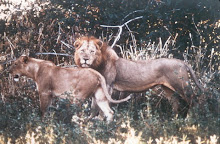Kapani and history of the company
Norman Carr established Luangwa's first safari camp in 1950. Back in the days when an African safari was a hunting experience, Norman developed the pioneering idea of taking people to look at animals and photograph them rather than to shoot them.This first safari camp was set up in partnership with the then Paramount Chief Nsefu and his people. This idea of involving the local people in the management of the wildlife was way ahead of its time. It was almost 50 years later that conservationists started developing the principles of "Community Based Natural Resource Management", in other words encouraging the traditional owners of the natural resource to take responsibility for its usage. Norman Carr's pioneering approach proved to be the forerunner to a cornerstone of modern day conservation policy.
The first 35 years of the company saw Norman set up and establish a number of safari camps across the Luangwa Valley, some of which are still in existence – Nsefu, Lion Camp, Chibembe and Chinzombo to name a few. In 1985 whilst running his safaris out of the old Mfuwe Lodge, Norman started construction on what would be his final safari camp, Kapani Lodge. He selected an elevated site overlooking the Kapani Lagoon. He knew the unpredictability of the Luangwa River well, and that this site would never flood and would never fall into the river.
Everyone associated with Norman Carr Safaris (NCS) is immensely proud of the heritage of the company. The principles of conservation and community responsibility established by Norman over half a century ago still run strongly through the company. We have been leading the way in responsible tourism in Zambia for over 60 years and we intend for that to continue.
In early 2012 we announced our new partners – the Dalais family and Chongwe Safaris in the Lower Zambezi – who along with co-owners and Directors Dave Wilson and Christina & Adrian Carr are pleased to share the next chapter of the Norman Carr Safaris adventure.
Throughout its history, NCS has always innovated; the first community based tourism, the first camps, the first walking safaris, the first community projects, the first luxury bush camps, the first all Zambian expert guiding team, the first Zambian female guide, the first majority Zambian Operations Board - the list of firsts is long!
We’re proud to continue this tradition and will continue to lead the way in innovation, the use of new ‘green’ technology, staff training and development and community involvement.
For Norman Carr Safaris, it has always been and continues to be all about CONSERVATION THROUGH TOURISM.
Original: http://www.normancarrsafaris.com
And a picture gallery: http://www.normancarrsafaris.com/#!/gallery/Camps/Kapani

